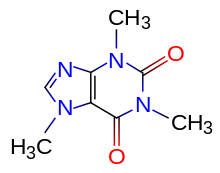Caffein
A central nervous system stimulant
| Caffein | |
|---|---|

| |
| INN | |
| Drug class | |
| Routes of administration | |
| Pregnancy category | |
| Bioavailability | |
| Metabolism | |
| Elimination half-life | |
| Excretion | |
| Legal status | |
| CAS Number | |
| PubChem | |
| DrugBank | |
| ChemSpider | |
| KEGG | |
Caffeine is a central nervous system (CNS) stimulant of the methylxanthine class. It is the world's most widely consumed psychoactive drug. Unlike many other psychoactive substances, it is legal and unregulated in nearly all parts of the world. There are several known mechanisms of action to explain the effects of caffeine. The most prominent is that it reversibly blocks the action of adenosine on its receptor and consequently prevents the onset of drowsiness induced by adenosine. Caffeine also stimulates certain portions of the autonomic nervous system.
Sources[edit | edit source]
Caffeine is found in various plants, where it acts as a natural pesticide that paralyzes and kills certain insects feeding on the plants. The most well-known sources of caffeine are the coffee bean, tea leaf, kola nut, and cacao pod. These sources are used to produce beverages such as coffee, tea, soft drinks, and energy drinks.
Effects[edit | edit source]
Caffeine is known to have both positive and negative effects on human health. It can improve alertness and concentration, reduce fatigue, and enhance cognitive function. However, excessive consumption can lead to insomnia, nervousness, restlessness, stomach irritation, nausea, increased heart rate, and other side effects.
Pharmacology[edit | edit source]
Caffeine is rapidly absorbed from the gastrointestinal tract and distributed throughout the body. It crosses the blood-brain barrier and exerts its effects on the CNS. The half-life of caffeine varies widely among individuals, influenced by factors such as age, liver function, pregnancy, and concurrent use of other drugs.
Metabolism[edit | edit source]
Caffeine is metabolized in the liver by the cytochrome P450 oxidase enzyme system, primarily by the enzyme CYP1A2. The main metabolites of caffeine are paraxanthine, theobromine, and theophylline, each of which has its own effects on the body.
Health Considerations[edit | edit source]
Moderate caffeine consumption is generally considered safe for most people. However, certain populations, such as pregnant women, individuals with certain medical conditions, and those sensitive to caffeine, should limit their intake. The FDA recommends a maximum daily intake of 400 milligrams for most adults.
See also[edit | edit source]
Related pages[edit | edit source]
- Central nervous system
- Stimulant
- Psychoactive drug
- Adenosine
- Autonomic nervous system
- Cytochrome P450
- Liver
Search WikiMD
Ad.Tired of being Overweight? Try W8MD's physician weight loss program.
Semaglutide (Ozempic / Wegovy and Tirzepatide (Mounjaro / Zepbound) available.
Advertise on WikiMD
|
WikiMD's Wellness Encyclopedia |
| Let Food Be Thy Medicine Medicine Thy Food - Hippocrates |
Translate this page: - East Asian
中文,
日本,
한국어,
South Asian
हिन्दी,
தமிழ்,
తెలుగు,
Urdu,
ಕನ್ನಡ,
Southeast Asian
Indonesian,
Vietnamese,
Thai,
မြန်မာဘာသာ,
বাংলা
European
español,
Deutsch,
français,
Greek,
português do Brasil,
polski,
română,
русский,
Nederlands,
norsk,
svenska,
suomi,
Italian
Middle Eastern & African
عربى,
Turkish,
Persian,
Hebrew,
Afrikaans,
isiZulu,
Kiswahili,
Other
Bulgarian,
Hungarian,
Czech,
Swedish,
മലയാളം,
मराठी,
ਪੰਜਾਬੀ,
ગુજરાતી,
Portuguese,
Ukrainian
Medical Disclaimer: WikiMD is not a substitute for professional medical advice. The information on WikiMD is provided as an information resource only, may be incorrect, outdated or misleading, and is not to be used or relied on for any diagnostic or treatment purposes. Please consult your health care provider before making any healthcare decisions or for guidance about a specific medical condition. WikiMD expressly disclaims responsibility, and shall have no liability, for any damages, loss, injury, or liability whatsoever suffered as a result of your reliance on the information contained in this site. By visiting this site you agree to the foregoing terms and conditions, which may from time to time be changed or supplemented by WikiMD. If you do not agree to the foregoing terms and conditions, you should not enter or use this site. See full disclaimer.
Credits:Most images are courtesy of Wikimedia commons, and templates, categories Wikipedia, licensed under CC BY SA or similar.
Contributors: Prab R. Tumpati, MD
